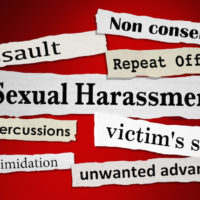Employer Tells Employee Complaining About Sexual Harassment To “Get Back To Work”

Having litigated sexual harassment cases for almost twenty years, our Citrus County, Florida sexual harassment lawyers have learned that employers often defend sexual harassment cases by arguing that sexually harassing behavior in the workplace does not necessarily constitute legally actionable harassment simply because the harassment involves verbal or physical conduct of a sexual nature. Rather, employers contend that a determination of whether an employee was subjected to legally actionable harassment requires an examination of the context in which the sexually harassing behavior took place. Read to learn more about whether context can affect a sexual harassment claim.
Under the contextual analysis approach to sexual harassment cases advocated by employers, women who work in certain work environments must put up with sexual behavior that women who work in different work environments are not required to tolerate. Stated another way, women working in certain work environments are afforded less protection from sexual harassment than women working in different environments. Consequently, under the contextual analysis approach advocated by employers and rubber-stamped by some courts, the standard for what constitutes legally actionable harassment varies depending on the victim’s work environment. The recent decision by the U.S. Fifth Circuit Court of Appeals in Gardner v. CLC of Pascagoula, LLC, No. 17-60072 (5th Cir. June 29, 2018) is instructive in showing how employers use a contextual analysis approach to justify their failure to protect employees from sexual harassment and immunize themselves from liability for sexual harassment.
Employee Sexually Harassed By Patient
In that case, Kymberli Gardner (Gardner) brought a hostile work environment sexual harassment claim against her former employer, CLC of Peascagoula, LLC (CLC), pursuant to Title VII of the Civil Rights Act of 1964. Gardner worked as a certified nursing assistant at an assisted living facility operated by CLC. Gardner’s employment with CLC ended with her termination.
During her employment with CLC, Gardner alleged that she was subjected to a sustained campaign of sexually harassing behavior by an elderly resident of the CLC facility named J.S. J.S. had a reputation for sexually harassing female employees, including grabbing their breasts and buttocks, asking for explicit sexual acts, and making lewd sexual remarks. J.S. had been diagnosed with a variety of physical and mental impairments, including dementia, personality disorder, and Parkinson’s Disease. Gardner, who became responsible for J.S.’s care, experienced these types of inappropriate behavior from J.S. “every day” for years. When Gardner attempted to discuss her concerns about J.S.’s behavior, her supervisor laughed, and the facility Administrator told Gardner to “put her big girl panties on and go back to work.”
Employers Must Protect Employees From Sexual Harassment Regardless of Context
The trial court dismissed Gardner’s sexual harassment claim. Remarkably, the trial court concluded that the “harassing comments and attempts to grope and hit [were] not beyond what a person in Gardner’s position should expect of patient’s in a nursing home.” In other words, the trial court reasoned that based on the context in which the sexual behavior occurred, Gardner was expected to tolerate the harassment and CLC was not required to protect her from the harassment. On appeal, the Fifth Circuit reversed the trial court’s decision and reinstated Gardner’s sexual harassment claim.
In reversing the trial court, the Fifth Circuit noted that other federal appellate courts have allowed victims to bring sexual harassment cases before a jury when patients engaged in physical conduct of a sexual nature. Applying this principle, the appellate court found that J.S.’s sexual behavior was sufficiently severe or pervasive to create a hostile work environment even considering his medical condition. In support of its finding, the court of appeals pointed out that J.S.’s sexual behavior “occurred daily,” involved “physical sexual assault and violent outbursts,” and interfered with Gardner’s work performance.
The Fifth Circuit also found that CLC failed to take reasonable steps to protect Gardner from J.S.’s sexually harassing behavior. Instead of taking action to protect Gardner and prevent the behavior from continuing, Gardner’s complaints were “met with laughter and dismissal by the administration.” In finding that CLC “failed to even attempt to remedy the situation,” the court of appeals rejected CLC’s self-serving argument that J.S.’s “various illnesses made it impossible to control his actions.” CLC “was not helpless in trying to mitigate his behavior,” the appellate court explained, because CLC could have assigned Gardner a security guard, reassigned Gardner to another position, or offered to remove J.S. from the facility. An employer’s obligation to protect employees from sexual harassment, the court of appeals pointed out, “exists even in the most challenging environments for controlling behavior, such as prisons.” Consequently, the Fifth Circuit ruled that Gardner’s sexual harassment claim must “proceed to trial.”
Free Consultation With Citrus County Harassment Lawyers
Our employment law attorneys have substantial experience representing employees who have been subjected to sexual harassment in the workplace. If you have been the victim of sexual harassment or have questions about your protection against sexual harassment, please contact our office for a free consultation with our Citrus County, Florida harassment attorneys. Our employee rights law firm takes sexual harassment cases on a contingency fee basis. This means that there are no attorney’s fees incurred unless there is a recovery and our attorney’s fees come solely from the monetary award that you recover.
